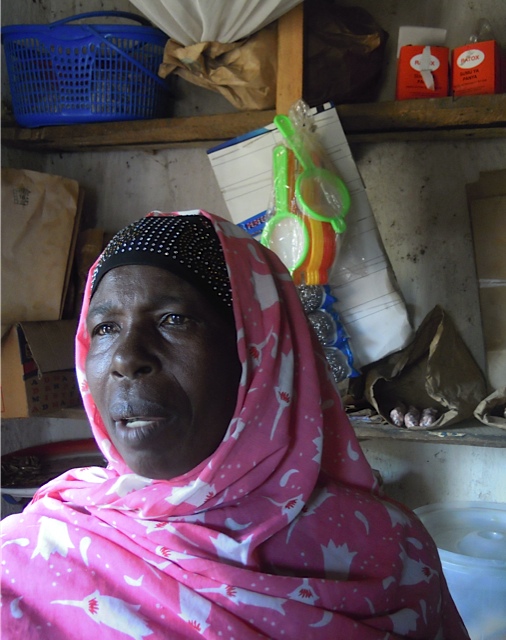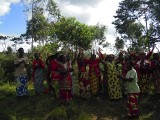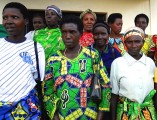
UKAid’s DfiD assessment of The Widowed Survivors’ Empowerment Project (WSEP), awarded to SURF and AVEGA, a 3-year programme that ended in March 2015, says, “Overall we have appraised your reported performance as A+”. According to DfiD “It is the group dynamics that is WSEP’s greatest achievement, to help widows deal with loneliness and trauma together, and to work collectively towards economic benefit, health, justice, empowerment in the community and to rise above poverty”. WSEP provided holistic support to nearly 19,000 widowed survivors of the Rwandan genocide against the Tutsi, and their dependants, in 15 out of 30 districts in Rwanda. Survivors Fund (SURF) received a grant funded by UKaid from the Department for International Development (DFID) of £966,360 for alleviating the poverty of genocide widows in Rwanda in partnership with AVEGA Agahozo, in 2012.
WSEP’s model empowered vulnerable widows to integrate into society, reducing poverty and symptoms of trauma through securing ownership of land and property, documenting and resolving legal issues, developing viable livelihoods through income generation, and enabling them to access health services. More work is to be done in sustainably securing the livelihoods of women and their dependants, but WSEP provides a secure base to leveraging this.
WSEP reached 18,519 genocide widows in poverty, and has made an immense difference to their livelihoods – its greatest achievement. Through WSEP, 7,721 beneficiaries (75 male/7,646 female), and an additional 3,597 widows (65 male/3,533 female) benefitted from livelihoods development training. 927 widows accessed loans through the LGF to create durable jobs and income, with others gaining skills and confidence to help them fight poverty, and to be empowered. In total, 3,087 widows accessed finance through formal and informal independent loans (through saving groups established out of earlier IGA training groups).

Effective trauma counselling: Addressing trauma remains a critical challenge in rebuilding the lives of survivors of the genocide who carry deep physical and emotional scars. 7,688 widows benefited from counselling sessions (1,499 men, 6,144 women, 12 boys, 33 girls), while 1,951 widows accessed counselling training delivered through the project (83 men, 1,842 women, 10 boys and 16 girls) enabling all to improve their confidence, trust and to empower them. WSEP’s counselling activity, delivered in part thanks to FARG and Foundation Rwanda funding, has provided much needed support and sustainably so through i) training volunteers within the target and ii) linking many subsequently into IGA groups. WSEP has demonstrated that psychosocial counselling support combined with IGA training in the post genocide environment is an essential and effective approach to rebuilding lives and communities, reducing poverty and empowering the most vulnerable, in particular women.
Organisational development: AVEGA opened offices in the North and South (50% of its membership) and strengthened AVEGA West. These now established structures are implementing organisational activities, designed to serve over 100,000 widows and their dependants sustainably. Capacity building and governance support helped to transform AVEGA into a strong actor in civil society and a leading women’s organisation. The baseline survey mapped AVEGA’s membership and identified needs and in conjunction with BLF’s GWEP project, provided data for both advocacy and professional management of programmes. AVEGA recruited 395 volunteers amongst beneficiaries. This, and training, has given rise to a lasting structure and skills sets to serve the most vulnerable. The volunteer model encompassed a youth association, AERG, that upskilled individuals and served to cement relations between younger and older generations. It provided for a strong and value for money project model.
According to DfiD “The project has done well to achieve the results that it has in challenging circumstances. All the output and outcome indicators are tackling key areas of recovery (including the ‘less visible’ areas like trauma counselling, trust, confidence and learning to live together again) and the evidence demonstrates that good progress has been made against legal entitlements to land, generating incomes, trusting others, accessing HIV services and dependants staying in school.”

Successful Soap: The Imboni za Gasonga Income Generation Activity (IGA) group
Imboni za Gashonga is 89-strong IGA group based in Rusizi District, Gashonga sector. They received entrepreneurship training through WSEP after which they raised savings worth Rwf 500,000 (£532) to start up the manufacture of soap to meet a wider community need.
Their plan was to manufacture cheap soap that would be affordable for a majority of people in their community. Through advocacy and a business plan thanks to WSEP, they mobilized a further Rwf 1.5 M (£1,596) in support. Today, their business is thriving, and their product has become a regular household item locally. Furthermore, they have plans to export to neighbouring DRC. Their production capacity is currently thirty cartons of twenty four soap bars per day (720 units), generating circa Rwf 288,000 (£300) before tax. Imboni za Gashongo have become leaders in the community and are a major stakeholder of the sector authorities.


